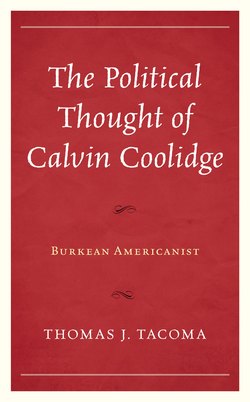Читать книгу The Political Thought of Calvin Coolidge - Thomas J. Tacoma - Страница 22
На сайте Литреса книга снята с продажи.
Conclusion
ОглавлениеThe net effect of the Progressive reforms was to expand both size and scope of the federal government. At the same time, the exclusive power of the political parties to control candidate selection was broken, and the power of state officials was largely circumscribed. The candidate-centered elections that began to emerge as the norm after the election of 1912 indicated the rising influence of direct primaries, but the creation of new expert agencies and commissions set a precedent to be followed for the rest of the twentieth century. The new power of presidential leadership over national politics and in social or cultural matters was another remarkable shift away from the nineteenth-century Whig conception of the presidency.[79] Perhaps the greatest change brought about by the Progressives, however, stemmed from their critique of the Declaration of Independence and the Constitution. No longer would a strict interpretation of the Constitution guide the federal government or serve to limit its powers. Government must be made to work for the people, the Progressives believed, and legal or constitutional formalism must bend to empirical realities.[80]
Little of this would have been possible if not for the philosophical and intellectual revolution that preceded the political movement. Of course, the transformation of the American intellectual landscape at the end of the nineteenth century was aided by the enormous changes in the economic and cultural conditions of the nation. Any observer of the years from 1880 to 1900 would have noticed that the circumstances of the nation now appeared worse for labor, that the lot of farmers was as hard as ever, and that large-scale immigration to the United States was presenting new problems in the cities.
These observations, however, need not have led directly to the conclusions drawn by the Progressive reformers that a more active federal government was necessary. Perhaps the problems of industrial society and the capitalist order could be solved without turning to nonconstitutional measures. Indeed, perhaps some solutions beyond nationalizing economic regulations and new bureaucratic agencies could be found. Other currents in American political thought certainly did speak even to the myriad new problems now confronting the United States. Progressivism may have been the dominant public philosophy of the early twentieth century, but it was neither perfectly unified nor was it the only extant political tradition. Other strands in American political thought still spoke effectively to politicians and voters. It was primarily on these other strands that Calvin Coolidge drew.
